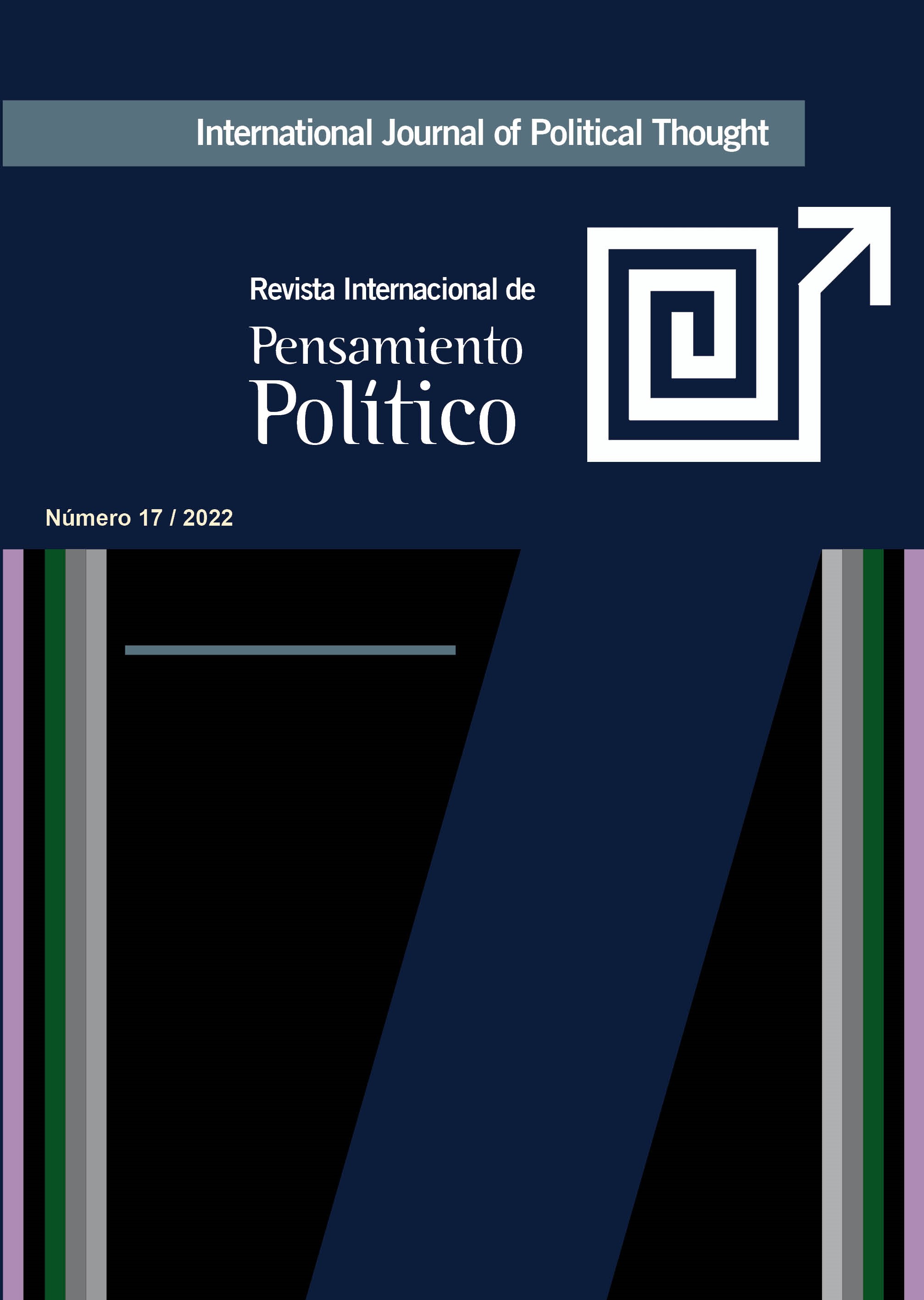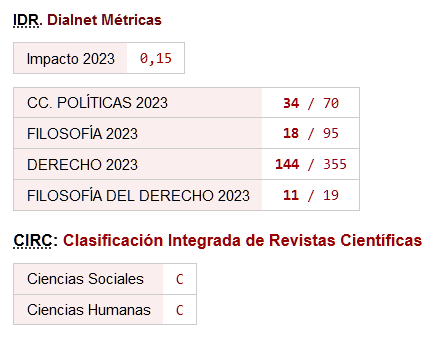The The Radical Vote of Young Spaniards
The Cases of Unidas Podemos and Vox
DOI:
https://doi.org/10.46661/revintpensampolit.7489Keywords:
Ideology, Youth voting, Political parties, PolarizationAbstract
The aim of this article is to check which variables explain the vote of young people for radical parties in Spain and how they behave in the different ideological extremes. That is, what differentiates the vote for Vox and for Unidas Podemos? Specifically, the case of voting for Unidas Podemos and Vox since 2019, the year in which the latter party entered Congress, is analyzed. To carry out this research, the analysis will identify the reasons that lead young people to vote for the different radical options as well as the differences between them and adults who also vote for these parties. This work is framed within the electoral behavior literature and bases its empirical contributions on data from the European Social Survey.
Downloads
References
Abramowitz, A. I., y Saunders, K. L. (2008). "Is polarization a myth?", The Journal of Politics, 70(2), 542-555. https://doi.org/10.1017/S0022381608080493
Albero, M. (2010). "Jóvenes, Internet y participación política", Límites y oportunidades, Barcelona, Octaedro.
Alfaro Redondo, R. (2019). Divide y votarás, San José, PEN.
Arzheimer, K. (2019). "Don't Mention the War: How Populist Right-Wing Radicalism Became (Almost) Normal in Germany", J. Common Mkt. Stud., 57, 90. https://doi.org/10.1111/jcms.12920
Arzheimer, K., y Carter, E. (2006). "Political opportunity structures and right‐wing extremist party success", European Journal of Political Research, 45(3), 419- 443. https://doi.org/10.1111/j.1475-6765.2006.00304.x
Bakker, B. N., Rooduijn, M., y Schumacher, G. (2016). "The psychological roots of populist voting: Evidence from the United States, the Netherlands and Germany", European Journal of Political Research, 55(2), 302-320. https://doi.org/10.1111/1475-6765.12121
Beck, U., & Beck-Gernsheim, E. (2009). "Global generations and the trap of methodological nationalism for a cosmopolitan turn in the sociology of youth and generation", European Sociological Review, 25(1), 25-36. https://doi.org/10.1093/esr/jcn032
Bendit, R. (2000). "Adolescencia y participación: una visión panorámica en los países de la Unión Europea", Anuario de psicología/The UB Journal of psychology, 33-57.
Benedicto, J. (2016). "La ciudadanía juvenil: Un enfoque basado en las experiencias vitales de los jóvenes", Revista Latinoamericana de Ciencias Sociales, niñez y juventud, 14(2), 925-938.
Bennett, W. L. (2012). "The personalization of politics: Political identity, social media, and changing patterns of par ticipation", The annals of the American Academy of Political and Social Science, 644(1), 20-39. https://doi.org/10.1177/0002716212451428
Billiet, J., y De Witte, H. (1995). "Attitudinal dispositions to vote for a 'new'extreme right-wing party: The case of 'Vlaams Blok'", European Journal of Political Research, 27(2), 181-202. https://doi.org/10.1111/j.1475-6765.1995.tb00635.x
Bischof, D., y Wagner, M. (2019). "Do voters polarize when radical parties enter parliament?", American Journal of Political Science, 63(4), 888-904. https://doi.org/10.1111/ajps.12449
Casal-Bertoa, F. y J. R. Caamaño (2017). "¿Democracia en crisis? El futuro de los partidos políticos y de la democracia representativa", Revista de las Cortes Generales, (100-101-102), 249-273. https://doi.org/10.33426/rcg/2017/100-102/31
Castaño, P. (2019). "Populismo de izquierda en Europa: una comparación entre Podemos y la Francia Insumisa", Revista de Estudios Políticos, (184), 41-65. https://doi.org/10.18042/cepc/rep.184.02
Crespo Martínez I. y Mora Rodríguez A. (2022). "El auge de la extrema derecha en Europa: el caso de Vox en la Región de Murcia", Política y Sociedad, 59(3), e75974. https://doi.org/10.5209/poso.75974
Dahlgren, P. (2011). "Mobilizing Discourse Theory for critical media politics: obstacles and potentials", en L. Dahlberg and S. Phelan (eds.), Discourse Theory and Critical Media Politics, Basingstoke, Palgrave, 222-249. https://doi.org/10.1057/9780230343511_10
De Vries, C. E., & Edwards, E. E. (2009). "Taking Europe to its extremes: Extremist parties and public Euroscepticism", Party Politics, 15(1), 5-28. https://doi.org/10.1177/1354068808097889
Diaz-Parra, I., Roca, B., & Romano, S. (2015). "Political activists' frames in times of post-politics: evidence from Kirchnerism in Argentina and Podemos in Spain", Contemporary Social Science, 10(4), 386-400. https://doi.org/10.1080/21582041.2016.1218042
Ehin, P., & Talving, L. (2021). "Still second-order? European elections in the era of populism, extremism, and Euroscepticism", Politics, 41(4), 467-485. https://doi.org/10.1177/0263395720986026
Fernández-Albertos, J. (2015). Los votantes de Podemos: del partido de los indignados al partido de los excluidos, Madrid, Catarata.
Ferreira, C. (2019). "Vox como representante de la derecha radical en España: un estudio sobre su ideología", Revista Española de Ciencia Política, 51, 73-98. https://doi.org/10.21308/recp.51.03
Fontaneda, J. L., & Sánchez-Vítores, I. (2018). "La desafección en las urnas: las elecciones generales de 2015 en España/ Disaffection at the Ballot Box: The 2015 General Election in Spain", Reis, 41-62. https://doi.org/10.5477/cis/reis.161.41
Franklin, M. N. (2004). Voter turnout and the dynamics of electoral competition in established democracies since 1945, Cambridge, Cambridge University Press. https://doi.org/10.1017/CBO9780511616884
Funes, M. J. (1999). "Jóvenes y acción voluntaria: la edad como factor condicionante en la acción participativa", Estudios de Juventud, 45(99), 87-92.
Garrido, A., Rodríguez, M. A. M., & Mora A. (2022). "Partidos spin-off, partidos nicho y derecha radical: El caso de Vox en España", Revista Internacional de Sociología, 80(2), e207-e207. https://doi.org/10.3989/ris.2022.80.2.21.10
Givens, T. E. (2016). "The radical right gender gap", en C. Mudde (ed.), The Populist Radical Right, Londres, Routledge, 308-326. https://doi.org/10.4324/9781315514574-26
Gómez, S. (2013). La cultura política de los jóvenes, México, El Colegio de Mexico AC.
Haggard, S., y Kaufman, R. (2021), Backsliding: Democratic regress in the contemporary world, Cambridge, Cambridge University Press. https://doi.org/10.1017/9781108957809
Hernández, A. E. (2019). "Protagonistas del cambio: identidades políticas y participación electoral de los jóvenes en España, 1982-2016", Acciones e Investigaciones Sociales, (40), 193-217. https://doi.org/10.26754/ojs_ais/ais.2019404202
Hirschman, A. O. (1970). Exit, voice, and loyalty: Responses to decline in firms, organizations, and states (Vol. 25). Cambridge, Harvard University Press. https://doi.org/10.2307/2325604
Ignazi, P. (1992). "The silent counterrevolution: Hypotheses on the emergence of extreme right-wing parties in Europe", European Journal of Political Research, 22(1), 3-34. https://doi.org/10.1111/j.1475-6765.1992.tb00303.x
Kathleen, M.H. (2010). "Impact of the economic downturn on young adults", Washington, Congressional Briefing on Recession and Recovery: how are Americans affected?
Krauskopf, D. (2010). "La condición juvenil contemporánea en la constitución identitaria", Última Década, 18(33), 27-42. https://doi.org/10.4067/S0718-22362010000200003
Lazarsfeld, P. F., B. Berelson y Gaudet, H. (1944). The People's Choice. How the Voter makes up his Mind in a Presidential Campaign, Nueva York, Columbia Univers
Levitsky, S., y Ziblatt, D. (2018). Cómo mueren las democracias (Vol. 1), Barcelona, Ariel.
Lipset, S.M. y Rokkan, S. (1967) "Cleavage structures, party systems, and voter alignments: an introduction", en S.M. Lipset and S. Rokkan (eds.), Party Systems and Voter Alignments: Cross-National Perspectives, Toronto: The Free Press, 1-64.
Lobera, J., y Rogero, J. (2017). "Medición de la cristalización electoral de un movimiento de protesta: De la indignación al voto", Empiria: Revista de Metodología de Ciencias Sociales, (38), 151-176. https://doi.org/10.5944/empiria.38.2018.19715
Mainwaring, S., y Pérez-Liñán, A. (2013). Democracies and dictatorships in Latin America: emergence, survival, and fall, Cambridge, Cambridge University Press. https://doi.org/10.1017/CBO9781139047845
Margulis, M. (2001). "Juventud: una aproximación conceptual", Adolescencia y Juventud en América Latina, 41-56.
Mateos, A., y Moral, F. (2006). El comportamiento electoral de los jóvenes españoles, Madrid, Instituto de la Juventud.
Mieriņa, I., & Koroļeva, I. (2015). "Support for far-right ideology and anti-migrant attitudes among youth in Europe: A comparative analysis", The Sociological Review, 63, 183-205. https://doi.org/10.1111/1467-954X.12268
Monge, C., Bergua, J. Á., Pablo, J. M., & Salas, D. P. (2021). Tras la indignación. El 15M: miradas desde el presente (Vol. 891054), Barcelona, Editorial GEDISA.
Morán, M. L., y Benedicto, J. (2016). "Los jóvenes españoles entre la indignación y la desafección política: una interpretación desde las identidades ciudadanas", Última Década, 24(44), 11-38. https://doi.org/10.4067/S0718-22362016000100002
Mudde, C. (2007). Populist Radical Right Parties in Europe, Cambridge, MA: Cambridge University Press, 2007. https://doi.org/10.1017/CBO9780511492037
Nieto, J. C. (2022). "Fragmentación y polarización parlamentarias en las Cortes Generales espanolas (2015-2019)", Revista de Estudios Políticos, (196), 159- 192. https://doi.org/10.18042/cepc/rep.196.06
Norris, P., y Inglehart, R. (2019). Cultural backlash: Trump, Brexit, and authoritarian populism, Cambridge, Cambridge University Press. https://doi.org/10.1017/9781108595841
Oesch, D., y Rennwald, L. (2018). "Electoral competition in Europe's new tripolar political space: Class voting for the left, centre-right and radical right", European Journal of Political Research, 57(4), 783-807. https://doi.org/10.1111/1475-6765.12259
Oñate, P., Pereira, M., y Mo Groba, D. (2022). "Emociones y voto a Vox en las elecciones generales españolas de abril y noviembre de 2019", Revista Española de Ciencia Política, (58), 53-81. https://doi.org/10.21308/recp.58.02
Parés, M. (2009). Participación y calidad democrática: evaluando las nuevas formas de democracia participativa, Barcelona, Ariel.
Ramiro, L. (2014). "Support for radical left parties in Western Europe: social background, ideology and political orientations", European Political Science Review, 8(01), 1-23. https://doi.org/10.1017/S1755773914000368
Recuero, F. (2015). "¿Quiénes son los simpatizantes de Podemos?", Análisis Político, 28(85), 112-130. https://doi.org/10.15446/anpol.v28n85.56250
Rodríguez Guerra, R. (2020). "Vicisitudes del sistema de partidos del Estado español (1977-2011): ¿bipartidismo imperfecto, sistema de partido dominante o pluripartidismo limitado?", Revista Laguna, 46, 9-26. https://doi.org/10.25145/j.laguna.2020.46.01
Rooduijn, M., Burgoon, B., Van Elsas, E. J., y Van de Werfhorst, H. G. (2017). "Radical distinction: Support for radical left and radical right parties in Europe", European Union Politics, 18(4), 536- 559. https://doi.org/10.1177/1465116517718091
Rosanvallon, P. (2020). El siglo del populismo. Barcelona: Galaxia Gutenberg.
Rydgren, J. (2007). "The sociology of the radical right", Annu. Rev. Sociol., 33, 241-262. https://doi.org/10.1146/annurev.soc.33.040406.131752
Rydgren, J. (2008). "Immigration sceptics, xenophobes or racists? Radical right-wing voting in six West European countries", European Journal of Political Research, 47(6), 737-765. https://doi.org/10.1111/j.1475-6765.2008.00784.x
Sartori, G. (2005). Elementos de teoría política, Madrid, Alianza Editorial.
Singly, F. (2005). Le soi, le couple et la famille, Paris, Armand Colin.
Sloam, J. (2014). "New voice, less equal: The civic and political engagement of young people in the United States and Europe", Comparative Political Studies, 47(5), 663-688. https://doi.org/10.1177/0010414012453441
Spierings, N., y Zaslove, A. (2015). "Gendering the vote for populist radical-right parties", Patterns of Prejudice, 49 (1-2), 135-162. https://doi.org/10.1080/0031322X.2015.1024404
Spierings, N., y Zaslove, A. (2017)."Gender, populist attitudes, and voting: explaining the gender gap in voting for populist radical right and populist radical left parties", West European Politics, 40(4), 821-847. https://doi.org/10.1080/01402382.2017.1287448
Stockemer, D., Lentz, T., y Mayer, D. (2018). "Individual predictors of the radical right-wing vote in Europe: A metaanalysis of articles in peer-reviewed journals (1995-2016)", Government and Opposition, 53(3), 569-593. https://doi.org/10.1017/gov.2018.2
Treminio, I., y Pignataro, A. (2021). "Jóvenes y el voto por la derecha radical: el caso de Costa Rica", Población y Sociedad, 28(2). https://doi.org/10.19137/pys-2021-280206
Vampa, D. (2020). "Competing forms of populism and territorial politics: the cases of Vox and Podemos in Spain", Journal of Contemporary European Studies, 28(3), 304-321. https://doi.org/10.1080/14782804.2020.1727866
Zhirkov, K. (2014). "Nativist but not alienated: A comparative perspective on the radical right vote in Western Europe", Party Politics, 20(2), 286-296. https://doi.org/10.1177/1354068813511379
Downloads
Published
How to Cite
Issue
Section
License
Copyright (c) 2022 Mélany Barragán

This work is licensed under a Creative Commons Attribution-NonCommercial-ShareAlike 4.0 International License.
Open access policy
Free and open access is allowed to any interested party to all the contents of the journal issues, free of charge, being able to print and transfer all the articles, with the only condition of specifying the source and authorship.
The journal: a) does not charge authorship costs for the processing of articles or for their submission, b) maintains copyright for authors without restrictions, c) facilitates authors to keep their publication rights without limitations.
The International Journal of Political Thought is an original work of the Laboratory of Political Ideas and Practices of the Pablo de Olavide University. All articles included in the Journal are original work of their respective authors. This Journal is freely offered to the scientific and academic community at no cost and releases the contents according to the license "Attribution-NonCommercial-ShareAlike 4.0 CC BY-NC-SA" of the Creative Commons project available in the following url: https://creativecommons.org/licenses/by-nc-sa/4.0/legalcode
If you wish to translate or compile any of the articles available here, please contact us at contacto












 ISSN: 1885-589X
ISSN: 1885-589X  Universidad Pablo de Olavide
Universidad Pablo de Olavide